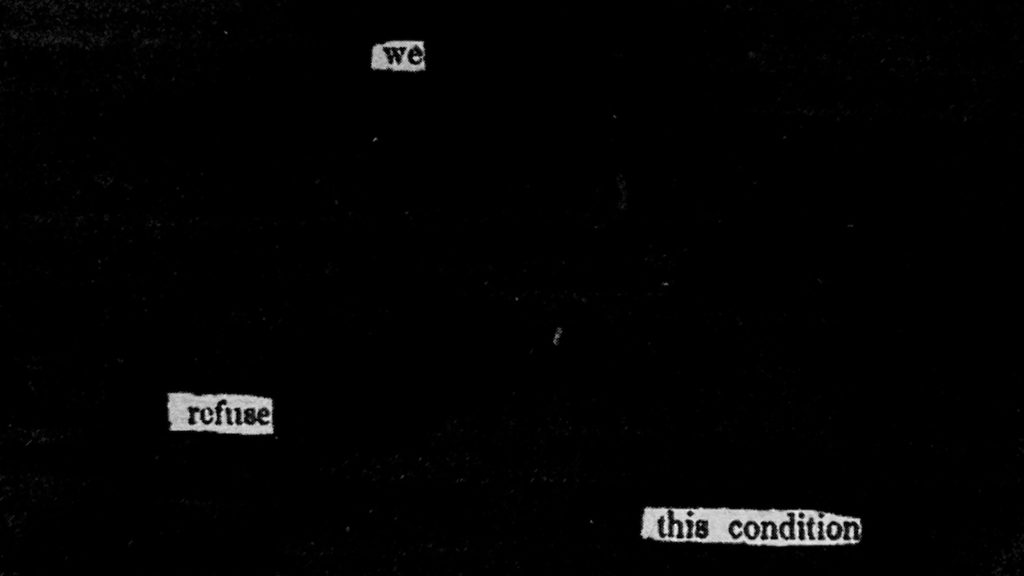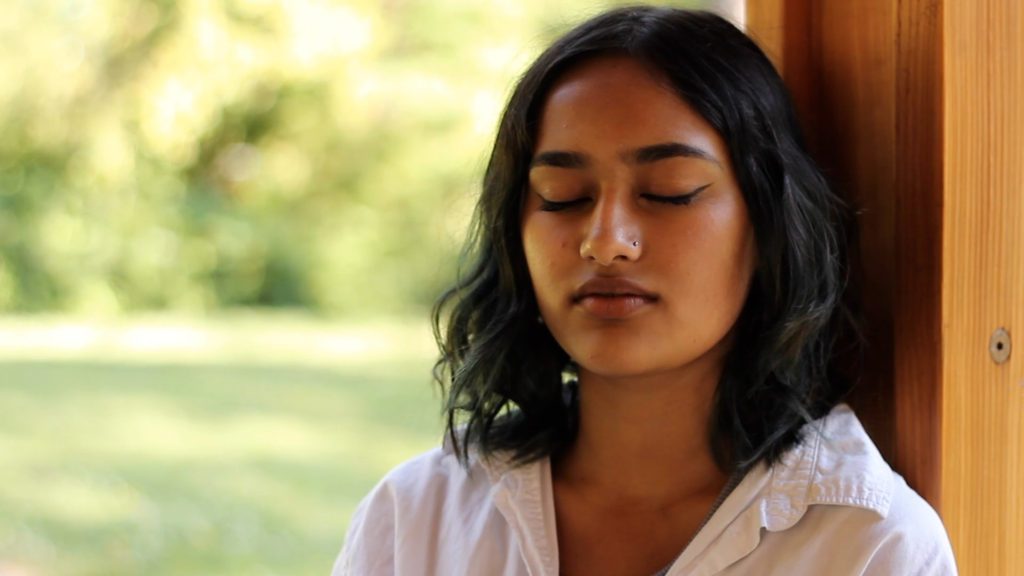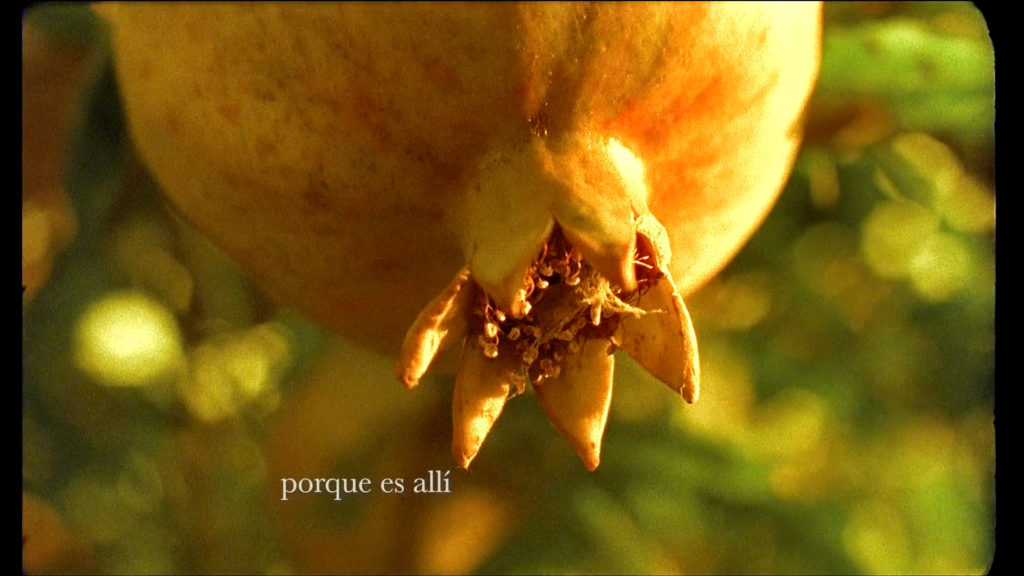Sunday September 24th, 7:30pm
Good Symptom Showcase
Works by Quenton Baker, Fatma Belkis, Arden Carlson, Roland Dahwen, Lourdes Figueroa & Peggy Peralta, Tiffany Jiang, Naima Lowe, Sarah Rushford, Tobi Springer
Curated by Marilyn Freeman, Rana San and Chelsea Werner-Jatzke
Marilyn Freeman and Anne de Marcken in attendance
— In person only —

Microscope is very pleased to present a screening of films in connection with the newly launched “Good Symptoms: A Serial Anthology of Time-Based Disturbances,” a project by independent press The 3rd Thing that every month releases a selection of videos pushing “the language of poetry, essay and hybrid literature off the page and onto the screen.”
The hour-long program — curated by Marilyn Freeman, Rana San and Chelsea Werner-Jatzke — features nine short videos, mostly made in 2022-2023, five of which are screening for the first time before an audience.
From the curators:
“Troubling the boundaries between cinema and literature, Good Symptom: A Serial Anthology of Time-Based Disturbances pushes the language and form of poetry, essay, correspondence, autobiography, manifesto, love letters, and hybrid literary work off the page and onto the screen. A singular collection of short films to be released over the course of 12 monthly online installments, Good Symptom is produced and distributed by The 3rd Thing – an independent press dedicated to publishing necessary alternatives, and invests fully in the conviction that necessary alternatives arise from artists who live and work outside dominant culture–queer, Black and Indigenous people, other people of color, and people living with disabilities. Find out more about Good Symptom HERE.“
Curator Marilyn Freeman and The 3rd Thing’s publisher Anne de Marcken will be in attendance to introduce the event and available for a Q&A following the screening.
General Admission $10
Member Admission $8
About the artists
Quenton Baker is a poet, educator, and Cave Canem fellow. Their current focus is black interiority and the afterlife of slavery. Their work has appeared in The Offing, Jubilat, Vinyl, The Rumpus and elsewhere. They are a two-time Pushcart Prize nominee, and the recipient of the 2018 Arts Innovator Award from Artist Trust. They were a 2019 Robert Rauschenberg Artist in Residence and a 2021 NEA Fellow. They are the author of we pilot the blood (The 3rd Thing, 2021) and ballast (Haymarket Books, 2023).
Fatma Belkıs was born in Antalya in 1985. She now lives in İstanbul. She is interested in narratives of individuals going through a transformation, specifically the ones who prefer not to do this alone. She works with text, video, and printed matter. While problematizing structures built on friendship and comradery, she focuses on contracts and the breaches of these contracts regarding these structures. Her works were shown in İstanbul and Sharjah Biennials and in institutions such as SALT, İstanbul Modern, DEPO, nGbK, Tensta Konsthall. The films she directed were shown at international film festivals in Turkey and abroad.
Arden Carlson works across mediums including video & performance. Arden’s concern is their practice, exploring how care is enacted in a body of work and how it reaches beyond, connecting to embodied experiences or the imaginary. The scope of Arden’s creative practice has been shaped by their experience as a queer individual in the rural south region of the United States.
Roland Dahwen is a writer, visual artist, performer, and filmmaker. He studied literature and translation before starting to work in documentaries. At the age of twenty, he made his first short film, There are no birds in the nests of yesterday, about the whistling language of the Canary Islands. He then worked at a documentary film company, helping to make and distribute films about immigration and citizenship. After making short films and video installations for several years, he directed his first feature film, Borrufa. Roland Dahwen was born in Brattleboro, Vermont, US and currently lives in Portland, Oregon. His primary hobby is gardening, with a particular affinity for palms and cycads.
Peggy Peralta & Lourdes Figueroa are partners in love, life, makers of visual art and proud momma’s of Agnés a red nose pit bull named after filmmaker hero Agnés Varda. Peggy, Lourdes & Agnés live and work in Oakland, California. Together in July of 2020 they launched Bilbil Projects– a space where poem & film come together.
Tiffany Jiang is a Chinese-American filmmaker based in Brooklyn who makes creative work exploring identity struggles, cultural taboos, and personal traumas. She received her Master’s in Media Studies and Advanced Certificate in Documentary Filmmaking from The New School. Tiffany’s creative roots stem from explorations in communication design, media arts, and photography. She primarily makes short films that weave together found materials and writing in various styles. Her films have been shown internationally across festivals and exhibitions.
Naima Lowe is Black queer disabled writer and artist who creates films, performances and texts using improvisational and collaborative strategies. With a BA from Brown University and MFA from Temple University, Naima has exhibited at Anthology Film Archive, Wing Luke Museum, MiX Experimental Film Festival, National Queer Art Festival and the Henry Art Gallery. Naima has been an artist in residence at Millay Colony, Vermont Studio Center, and the Bemis Center for Contemporary Art. She’s currently a Mid America Arts Alliance Interchange Artist Fellow, recipient of the Mid America Arts Alliance Artistic Innovation Award, and recipient of the Jazz Road Creative Residency. Naima resides in Tulsa, within the Muscogee Creek Nation Reservation, where she spends her time being free and talking to animals.
Sarah Rushford is an interdisciplinary writer, and video artist originally from Massachusetts and living in Portland, Oregon. She has shown interdisciplinary work widely over the past twenty-six years, and has a forthcoming solo exhibition at Rubus Discolor Project. She has had recent solo and group exhibitions at Grapefruits and Carnation Contemporary in Portland, OR. Rushford is an MFA Candidate in Visual Studies, an interdisciplinary program at Pacific Northwest College of Art, and her poems and text-art have appeared in the literary journals Houseguest, Tuesday: An Art Project, and Mother, Mother. She has completed residencies at Union Docs, Takt Kunstprojektraum, Berlin, and ArtFarm, Nebraska, and she was recently a Co-Director at Ortega y Gasset Projects in Brooklyn.
About the curators & organizers
Media artist, writer, contemplative guide and independent scholar, Marilyn Freeman works at the intersections of reckoning and resiliency, queerness and film, and contemplative, creative and social art practices. They are author of The Illuminated Space: A Personal Theory and Contemplative Practice of Media Art (The 3rd Thing, 2020) and creator of Cinema Divina—short films made through and for guided contemplative practice. Their text and media arts essays have been published in or at The Fourth Genre, Ninth Letter, TriQuarterly, Blackbird, Rolling Stone and Abbey of the Arts. Their films are screened on PBS and in galleries, spirituality centers and festivals worldwide. More at marilynfreeman.com.
Rana San is an intermedia artist, curator, and night dreamer pondering language and lineage, intimacy and interdependence. Her curatorial and creative practice centers experimental and analog approaches to storytelling through film, writing, and movement presented on screen and stage. She is co-founder and co-director of the annual Cadence Video Poetry Festival.
Chelsea Werner-Jatzke is a writer and arts organizer exploring the liminal spaces of the literary arts. She is the author of 3 chapbooks and is co-founder and co-director of the annual Cadence Video Poetry Festival.
The 3rd Thing is an independent press dedicated to publishing necessary alternatives. They publish projects representing in form, content and perspective their interdisciplinary, intersectional priorities. They think of each project in the cohort as a break in the stockade—a way out of the settlement and into the wilderness. Often their books are the result of an artist working in a non-dominant discipline—a playwright writes a book of poems, a theater-maker writes a book of essays, a filmmaker writes a book of theory…. And while their emphasis is on print traditions, the projects may take any number of forms: books, broadsides, performances, installations, colloquia, video anthologies, etc. The 3rd Thing publishes work primarily by artists and writers who identify as members of traditionally marginalized groups, primarily Indigenous people, womxn, queer people and people of color. Learn more at the3rdthing.press.
Anne de Marcken is an interdisciplinary writer, artist and publisher of The 3rd Thing. She is author of the novel It Lasts Forever and Then It’s Over (New Directions, Fitzcarraldo Editions and Giramondo, 2024) and the lyric novella, The Accident: An Account (Spuyten Duyvil, 2020). Her work across disciplines has garnered numerous awards including the 2022 Novel Prize, an Artist Trust Fellowship and a Millay Colony Fellowship. She lives at the southernmost tip of the Salish Sea on the unceded land of the Coast Salish people, where she works as Editor and Publisher of the independent press, The 3rd Thing.

Program:
care could suck in the future [sic]
By Arden Carlson, 2022, USA, 07 minutes 54 seconds
Artist Arden Carlson cribs the educational how-to format to render a queerly comic, sparsely staged, meticulously choreographed instructional video for enacting care and splices it with a series of interstitial stock footage sequences of wild horses, each one narrated by a disembodied voice-of-God praising the attributes of horses with a patriarchal authority defining of 1950s America. A darkly funny coupling of dystopic retrofuturism and video mixtape, care could suck in the future [sic] makes its world premiere in Good Symptom.
My phone needs to charge so this’ll be a little far away
By Tobi Springer, 2022, Netherlands, 2 minutes 40 seconds
In My phone needs to charge so this’ll be a little far away, director, animator, and sound designer, Tobi Springer, pairs conversational interview snippets and personal essay with an improvised, lulling piano score and evocative hand-drawn, reflexive animation. Fleeting in ordinary time and everlasting in tender originality, My phone needs to charge so this’ll be a little far away is a trans-genre journey into being and becoming and wondering what the future holds. A world premiere in Good Symptom.
According To Sun Ra, None Of Us Are Real
By Naima Lowe, 2020, USA, 4 minutes 38 seconds
Naima Lowe disrupts conventional notions of the biopic in this genre-nonconforming piece centering the mundane queerness of legendary Sun Ra—the prototype Afrofuturist and hugely influential jazz musician. Using improvisational strategies rooted in alchemic survival practices known as Black cultural production, Lowe couples her perfectly imperfect pre-recorded reading of this Sun Ra poem she wrote with an improvised video performance she performs. Captured by a fixed-frame, locked-down camera on auto-focus, Lowe stands behind a translucent shower curtain fully dressed. Calm as a well-practiced alchemist, she runs, pours, and drinks water. Certain spoken words appear as text on-screen as Lowe appears in and out of focus while water drops flow into ramifying moons. Infused with dreamy visual style and graceful poetic swings—a judicial racial slur leaps to drinking starlight, to disrupting hate speech, to breathing while Black. A genre-fluid classic, According to Sun Ra, None of Us are Real is a liberating tonic honoring the ordinary queerness of a Black legend.
Results May Vary
By Tiffany Jiang, 2022, USA, 4 minutes 7 seconds
In a deft assemblage of deteriorating found footage, the nostalgia of a scratchy old record, and a kind of fragmented lyric essay rendered in text-on-screen, Brooklyn-based, second-generation Chinese American filmmaker, Tiffany Jiang, questions the reliability of family history and photo albums, considers the possible outcomes of child rearing, and wonders about having children at all. Queer and non-binary, Jiang renders a dreamy assemblage. Results May Vary is at once of the archive and the archive revitalized, wary and interrogatory, melancholy and hopeful.
Keje
By Fatma Belkis, 2012, Turkey, 1 minute 43 seconds
Writer/director Fatma Belkis reclaims the filmic artifacts of Turkish discrimination against Kurds in the singular micro short, Keje. Belkis picks up cutting room floor film remnants from Seyyit Han, a 1968 film that managed distribution approval by the Turkish Committee on Film Censorship only after producer, Abdurrahman Keskiner, excised every single utterance of the leading female character’s name, “Keje”—because it was a Kurdish name. This rejection of a Kurdish name was only one tyrannical enforcement of an official state policy exacting a comprehensive denial of Kurds as an ethnic population. Here then, with redemptive ease, Belkis resurrects and coalesces every single utterance of the name in a kind of inevitable rapid-fire response and features the “Keje” quickfire between Seyyit Han’s original opening sequence and the film’s final “The End”. Keje is not just genre-defiant but utterly defiant. And restorative.
we pilot the blood
By Quenton Baker, 2023, USA, 6 minutes 18 seconds
Quenton Baker’s we pilot the blood considers the position of Blackness and the ongoing afterlife of slavery in this cinematic adaptation of their poem by the same title, crafted from redacted U.S. Senate documents detailing the 1841 revolt of enslaved people aboard the brig Creole. “Quenton Baker’s redactions are Black redactions,” writes scholar Christina Sharpe, “to make documents…speak something that they were never meant to reveal.” Those revelations are intercut in a meditative visual mix with the sea—alive and moving, closeup and tender—and paired with Baker’s transporting vocalization—at once urgent, slow, visceral, and prophetic. A world premiere in Good Symptom.
May 35
By Roland Dahwen, 2022, USA & China, 10 minutes
Referring to the anniversary of the 1989 Tiananmen Square massacre known in China as the June Fourth Incident, May 35 is an evocative split-screen reincarnation by artist Roland Dahwen of his two-channel museum installation. Equal parts personal and political, historical and imagined, May 35 rests on a cinematic score of aural ebbs and flows, and mixes Dahwen’s own words spoken and displayed news-ticker style with text generated from image-recognition software over a visual examination of Tiananmen Square as an intersection of history, tourism, regulation, and surveillance. A USA premiere in Good Symptom.
I also knew this
By Sarah Rushford, 2022, USA, 8 minutes 55 seconds
In a subtle fusion of literary ritual, sociological experiment, performance, autobiography, and poetry, I also knew this not only re-thinks the role of authorship but does so right before our eyes. Interdisciplinary writer, artist, and video maker Sarah Rushford delivers an imaginative “video project” that is simultaneously unsettling and inviting. No spoiler alert here, there is a real thrill seeing this work for the first time without knowing exactly what’s happening. A world premiere in Good Symptom.
Las Marimacha Fragments
By Lourdes Figueroa & Peggy Peralta, 2022, USA, 14 minutes 53 seconds
In Las Marimacha Fragments Lourdes Figueroa’s sublime love-letter-like poem is voiced by her and coupled with Peggy Peralta’s splendorous edit–a visual array of lived moments from their 15-plus years together mixed with cityscapes from peopled and hectic to sensuous and serene. Centered in San Francisco, this cinematic homage to love queers the city symphony film genre of the 1920s-30s in a poetic and stirring offering to be savored again and again. A world premiere in Good Symptom.

